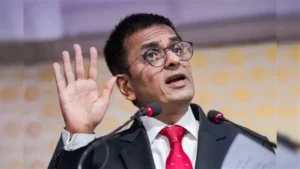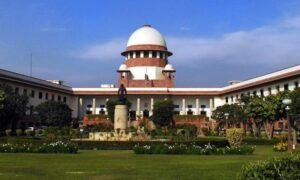The widely contested legal dilemma regarding Finolex Cables has spawned a controversial storyline between the veteran members of the National Company Law Appellate Tribunal (NCLAT) against the Supreme Court of India, unfolding as a distinctively unorthodox judicial spectacle. This intricate legal dispute centers on a commercial dispute concerning Finolex Cables and Deepak Chhabria’s controversial reappointment as the esteemed Executive Chairman of the firm.

Significantly, a lot of attention has been drawn to the SC’s bold decision to send contempt notices to NCLAT members who had a strong background in jurisprudence and technical proficiency. In the context of the Finolex Cables case, Chief Justice of India DY Chandrachud asked why the Supreme Court shouldn’t start contempt proceedings against judicial members Rakesh Kumar and Alok Shrivastava. He also ordered them to appear in person on October 30.
The Finolex Cables Case
The legal maze surrounding the possible return of Deepak Chhabria as Executive Chairman of Finolex Cables has caused a quake in the corporate hierarchy. The contentious handling of Deepak Chhabria’s potential return gave rise to a fierce disagreement that was finally settled by the National Company Law Appellate Tribunal (NCLAT).
Supreme Court’s Order Defied
The legal maze became even more confusing when the NCLAT rendered a decision that was completely at odds with one that the Supreme Court of India had previously rendered. The SC chose an unorthodox legal course of action in reaction to this audacious act of disobedience, sparking a debate characterizing the NCLAT’s actions as “unbecoming of a judicial tribunal.” As a result, the parties to the tribunal were charged with contempt charges, underscoring the seriousness of this disagreement that goes beyond simple economic disagreements and touches on the authority and validity of India’s legal system, which is the cornerstone of the country’s judicial system.
characterizing the NCLAT’s actions as “unbecoming of a judicial tribunal.” As a result, the parties to the tribunal were charged with contempt charges, underscoring the seriousness of this disagreement that goes beyond simple economic disagreements and touches on the authority and validity of India’s legal system, which is the cornerstone of the country’s judicial system.
A turning point was recently reached when the Supreme Court cited members of the National Company Law Appellate Tribunal (NCLAT), a committee that includes both legal and technical experts, for contempt. If they are found guilty, contempt of court has serious consequences in the Indian setting. This event exemplifies the SC’s unwavering commitment in the face of what it considers to be flagrant and daring contempt of its orders. Legal experts, business titans, and the general public have been forced to reflect seriously on the matter, highlighting the necessity of preserving the integrity of India’s legal system and the untouchability of court rulings.
Suspension of NCLAT’s Judgment
Following the clear decision made by the Apex Court, the National Company Law Appellate Tribunal (NCLAT) made the unusual decision to rescind its own judgment in the Finolex Cables case. This suspension was largely prompted by the SC’s harsh criticism of the NCLAT’s earlier conduct. The subsequent retraction of the NCLAT’s ruling may be seen as an earnest recognition of the Apex Court’s supreme authority and a firm resolve to rectify the current state of affairs.
There are significant and broad ramifications from the Finolex Cables case. They emphasize the necessity of strictly following the rulings of the highest court and clarify the possible consequences of not doing so. Legal experts and spectators are keeping a close eye on this case because they see it as a possible precedent for handling future instances of disobedience to court orders. It also emphasizes how urgently accountability and openness are needed in the area of business operations. Talks about Deepak Chhabria’s reappointment as Executive Chairman of Finolex Cables have sparked discussions about corporate governance and shareholder concerns.
The Corporate Aspect
The core of the Finolex Cables case explores the complex web of commercial connections. Finolex Cables’ shareholders argued passionately about Deepak Chhabria’s potential reappointment as executive chairman. Under these kinds of situations, corporate governance becomes extremely important because stakeholders want well-thought-out actions that serve their interests. The implications of this case are likely to have a lasting effect on corporate governance standards across India, acting as a sobering reminder that business decisions need to carefully weigh the interests of shareholders against compliance with legal and ethical requirements.
The Legal Landscape
A unique moment has occurred in Indian legal history, as it is exceptionally uncommon for the Supreme Court to file a contempt case against respected members of the National Company Law Appellate Tribunal (NCLAT). It is evidence of the judiciary’s steadfast dedication to preserving the sacred rulings of the law and making sure they are respected and obeyed.
The legal community is eager to see how this extraordinary case plays out because it has the potential to not only establish a precedent that might be revolutionary, but also to change how future cases of noncompliance with court orders are handled. The consequences of this legal drama are closely watched because they have the capacity to have unanticipated effects on the legal system and change how society views and reacts to challenges to the court’s power.
There is a buzz of interest in the hallowed halls of justice as scholars and legal experts engage in lively discussions about how this specific case could affect future jurisprudence at this critical juncture. It serves as proof of the enduring values that support the rule of law and the judiciary’s persistent dedication to upholding its integrity.
The resolution of this legal battle might have a lasting impact on Indian jurisprudence, acting as a lighthouse of instruction for the next generations as they navigate the complex waters of upholding court rulings and administering justice.
Conclusion
In summary, the Finolex Cables case is a classic example of a company conflict that has developed into a significant judicial battle. A landmark ruling in India’s legal history was made by the Supreme Court when it decided to file contempt charges against National Company Law Appellate Tribunal (NCLAT) members. It emphasizes how crucial it is to protect the integrity of the legal system and the untouchability of court rulings. This legal mystery has broad ramifications for corporate governance, legal precedents, and the complex meaning of contempt of court in the Indian setting.
Witnessing the development of this case inside its complex story is going to be an exciting undertaking. It might influence how future responses to cases of disobedience with court orders are shaped, which is something that the corporate industry, the legal community, and the general public are closely watching. Everybody involved understands that this case has the potential to establish a precedent that will determine the future course of India’s legal system. Thus, this case serves as a sobering reminder of how crucial it is to respect court rulings and maintain the rule of law, which are essential to a vibrant democratic society










